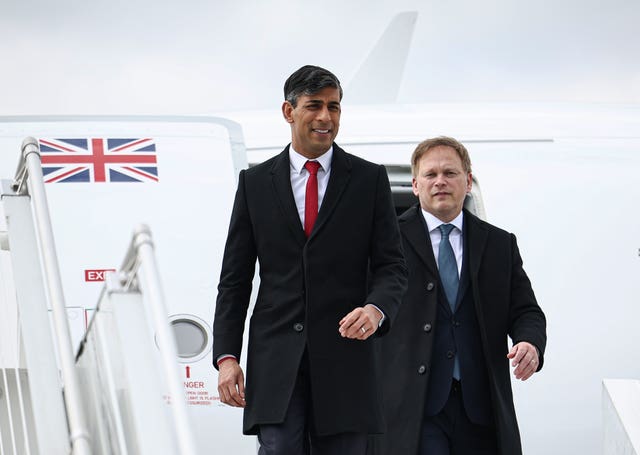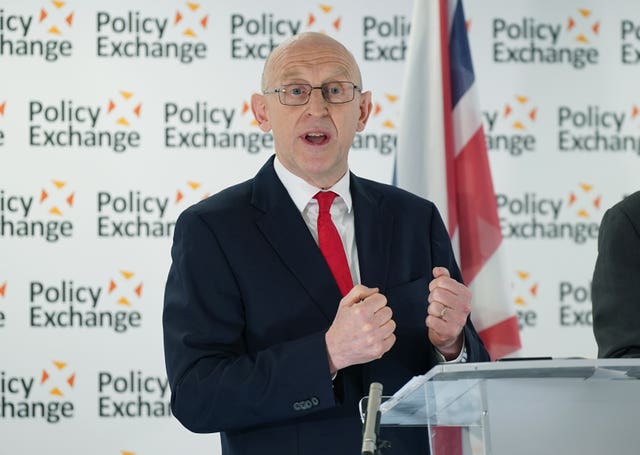Government’s defence spending plan has more holes than Emmental cheese, MP says
Shadow defence secretary John Healey told the Government that ‘you can’t defeat Putin with press releases’ as he questioned the Tories spending plans.

“You can’t defeat Putin with press releases,” the Government has been warned, as Labour questioned the veracity of the Tories’ defence spending promises.
Last month, Prime Minister Rishi Sunak said the UK will spend 2.5% of gross domestic product (GDP) on defence by 2030, an extra £75 billion in defence spending over the next six years.
During a general debate on defence in the Commons on Tuesday, Defence Secretary Grant Shapps told MPs the spending commitment is “precisely what our armed forces need”.

However, shadow defence secretary John Healey said the pledge had not been adequately funded and the Government numbers had “more holes than in Emmental cheese”.
Mr Healey said: “The 2030 target is not in the Government’s financial plans, it’s in a press release. And you can’t rebuild the UK armed forces, you can’t let long-term procurement contracts, you can’t deter those who threaten us, you can’t defeat Putin with press releases.
“If this 2030 plan had been in a budget, it would have been independently checked, it would have been openly costed and it would be fully funded. It isn’t, it wasn’t and there are more holes in the Defence Secretary’s numbers than in Emmental cheese.
“The Institute for Fiscal Studies has called the £75 billion figure essentially meaningless. The Institute for Government has said that the Conservatives’ 2.5% plan does not add up and the Institute for Government has also said cutting 70,000 civil servant jobs will get nowhere close to delivering the savings needed to fund 2.5%.”
Earlier Mr Healey said Labour would aim to spend 2.5% on defence but did not say when they believed this would be possible.

He said: “The defence of the UK starts in Ukraine. If Putin wins, he won’t stop with Ukraine. So let me just say very clearly, Labour will always do what is needed, spend what is needed on defence.”
He later added: “We share that ambition to hit 2.5%, our commitment to 2.5% is total and we will do it in our own way and we will do it as soon as we can.”
Earlier when opening the debate, Mr Shapps said: “We’re offering another £75 billion in cash terms, which I know that the party opposite has yet to do, for example, because it requires I think, a determination in our case to fund it, to get the civil service back to pre-Covid levels and to help pay for the expansion in our defence.
“It requires sound economic management and above all, an understanding that investment in deterrence today is wiser and less painful than paying to fight a war tomorrow.”
Intervening, Labour former minister John Spellar said: “But hasn’t he just confirmed, that the amount of money in the Budget designated for the British armed forces has in fact gone down?”
Mr Shapps replied: “No, I still haven’t confirmed that because in fact, before the extra half a billion if you take the outcome from last year, and the amount that was pledged for this year, including to be clear, including supplementaries, which is the same way it was based upon last year, it would be an increase of 1.8%.”
He added: “This Conservative £75 billion rise in defence spending is highly significant, it’s precisely what our armed forces need to respond to axis or authoritarian states who are trying to reshape the world in their image and it’s the right thing to do.”
SNP defence spokesman Martin Docherty-Hughes said his party is pushing for a “more coherent defence” approach with the European Union, adding: “Not to replace Nato, but to understand some of the complexities that EU members face when it comes to logistics, road design, bridge weights, it would be far easier tackled through the EU in a partnership with them.”
Mr Shapps went on to say that he and Foreign Secretary Lord David Cameron will be urging Nato countries to “follow our example” by committing to similar increases in defence expenditure.
He said: “Putin’s war in Ukraine has underlined the need for all Nato allies to rebuild their stockpiles and grow their defence industrial base.”
He added: “I thank, as I know the whole House will, the committed, professional and courageous members of our armed forces for everything that they do for us in more difficult times. They keep us safe. We’re backing them with more money, and in a more dangerous world, I think that is the right thing to do.
“And as I go to Washington with the Prime Minister for the Nato summit in July, we will be saying to other Nato countries – follow our example. Follow us, because it’s the right thing to do, it’s cheaper to do, it’s more effective than waiting for wars and conflicts to break out, I encourage other members in this House to follow us.”





